VIEPOINTS – Something familiar, something peculiar, something for everybody: A London theater roundup
- By drediman
- August 1, 2022
- No Comments
I recently returned from a whirlwind trip to London, during which I immersed myself in the capital’s world famous theater scene. Over the course of roughly a single week, I managed to fit in sixteen shows (!), most of which I’ll discuss below. Overall, I’m happy to report that the trip was a resounding success. Indeed, on this side of lockdown (I was last in London during the spring of 2019), the city’s theater has emerged as vibrant as it’s ever been, exhibiting an eclecticism that I found intoxicating. No matter what you’re looking for, you’ll likely find it on one of London’s many stages.
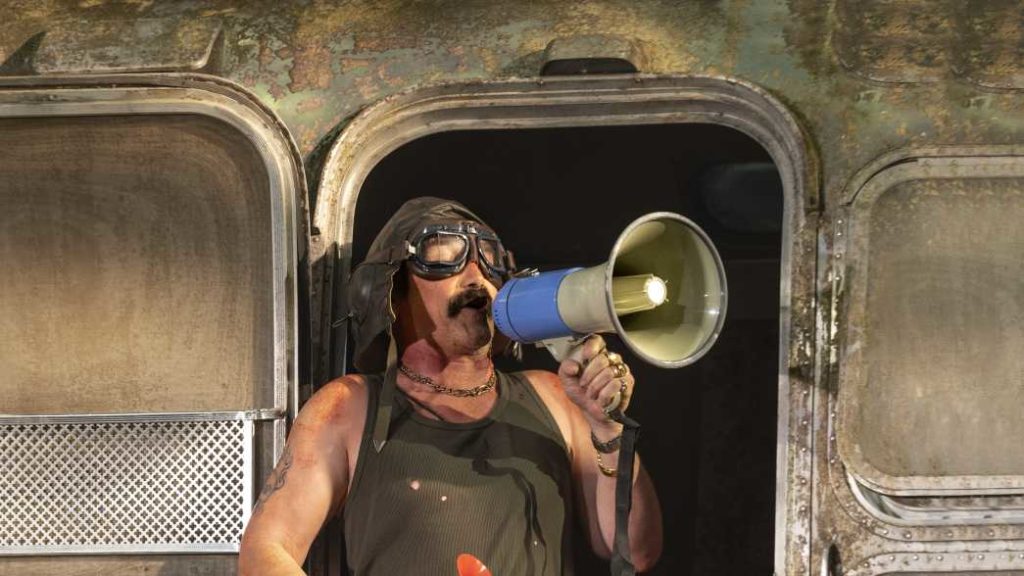
State of the nation plays
Leading the way are a trio of plays that brilliantly capture the state of the nation. Between Covid, Brexit, and a nearby war, there’s been plenty to process. Luckily, these theatrical creations have allowed playgoers to thoughtfully do so.
Although Jez Butterworth wrote Jerusalem (HIGHLY RECOMMENDED) in 2009 (when the Labor party was still in power), it’s still as relevant as ever, which is a testament to the work’s ability to morph with passing history. The production at the West End’s Apollo Theatre remains a stunner – rarely do plays unfold as organically and with the same kind of mythic force as Mr. Butterworth work – particularly as directed by Ian Rickson, who has returned to re-mount the play with the original creative team. The great Mark Rylance – arguably the finest stage actor of his generation – also returns to breathe life into the play’s anti-hero Johnny “Rooster” Byron. It’s one of the titanic performances of our time, one that I’m thankful to have experienced again all these years later. Also returning to the play is MacKenzie Crook, who gives a nuanced and moving performance as one of Rooster’s scraggly apostles. Together, they valiantly fight the fight once more, only this time, the enemy beating at the gates is now something more slippery and amorphous than we had originally anticipated.
At the esteemed Royal Court in Sloane Square (where Jerusalem was first staged), I caught the closing night performance of Dennis Kelly’s That Is Not Who I Am, otherwise stealthily known as Rapture (HIGHLY RECOMMENDED) by Lucy Kirkwood. Speculatively based on recent real life events, the work sinuously explores the personal realities we build for ourselves and their intersections with social media, and therefore the world at large. Central to the play is the role of conspiracy theories, which drives the perverse and creepy sense of paranoia that pervades the piece. Part astute cautionary tale, part bizarre love story – the work calls to mind a more fleshed out, eerily relevant version of Tracy Letts’ now-classic play Bug – Ms. Kirkwood’s play possesses a prismatic quality that I’m still fascinating over. As the two central lovers, Siena Kelly and Jake Davies gave chilling performances that got under my skin. I’ll be curious to see if this one has further life ahead of it.
Lastly, there’s the Almeida Theatre production of Patriots (HIGHLY RECOMMENDED), Peter Morgan’s Shakespearean take on oligarch Boris Berezovsky’s relationship with Vladimir V. Putin and his role in creating the monster that’s currently wreaking havoc. Although it takes a more straightforward route in its storytelling and is less artfully theatrical than the two plays above, Patriots finds Mr. Morgan – who penned The Queen, The Audience, and The Crown for film, theater, and television, respectively, making an art form of dramatizing the lives of celebrity-status political figures – at the peak of his powers. His latest is a caustic, imminently watchable work of theater that commands the audience’s attention from the get go, thanks largely to director Rupert Goold’s taut staging and the excellent performances he illicit from his cast, notably Tom Hollander and Will Keen as Berezovsky and Putin. Mr. Hollander is particularly memorable, giving a Falstaffian star turn that’s in equal measure gleeful and tragic.
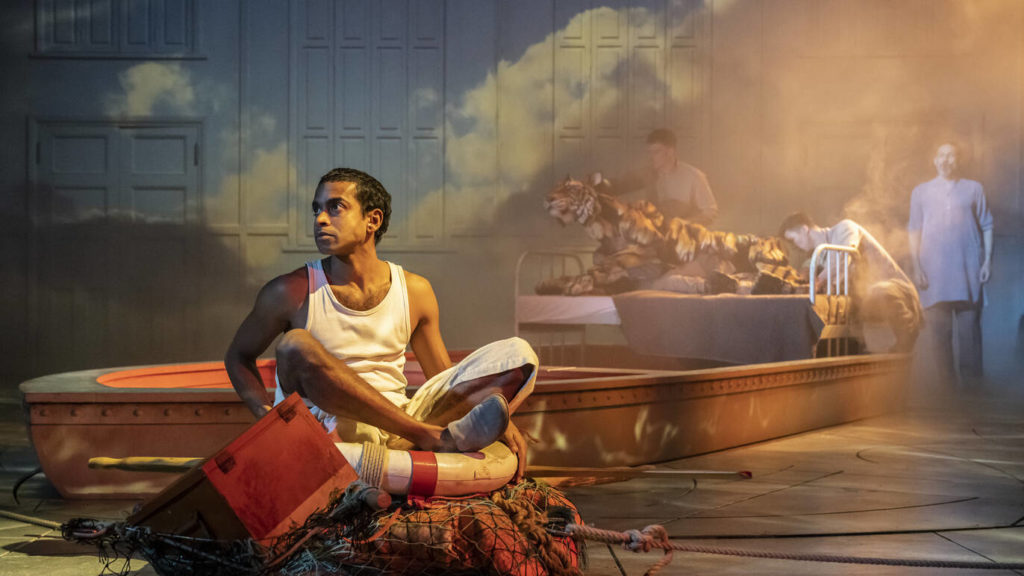
Escapist plays, on the other hand
On the other end of the spectrum is another trio of new plays. In their case, the goal was to get as far away from the stark realities of life as possible and provide escapism to those in need of it.
The Brits have always been susceptible to good old whodunits and ghostly yarns – for proof, one need not look further than the never-ending runs of the West End productions of The Mousetrap and The Woman in Black. Continuing in this tradition is the Olivier-nominated new play 2:22 (RECOMMENDED) by Danny Robins at the Criterion Theatre located just off of Piccadilly Circus. A ghost story in the same vein as the hit film The Sixth Sense, Mr. Robins’ play melds psychological thriller, murder mystery, and supernatural speculation. As directed by Matthew Dunster, the production unabashedly (although at times awkwardly) taps into giddy cheap thrills, in addition to making a serious attempt at mining and unlocking the characters’ tightly-wound psychologies. Just like those aforementioned long-running hits, 2:22 – which is back in Theatreland with a solid new cast for its third discrete run – seems destined to thrill and haunt West End audiences for a long time to come.
Over at the National Theatre’s Olivier Theatre, Richard Bean attempts to rekindle the magic that infused the hit play One Man, Two Guvnors in his latest comedy Jack Absolute Flies Again (RECOMMENDED). If the work (co-written by Oliver Chris) – which updates Richard Brinsley Sheridan’s classic Restoration play The Rivals to Britain during World War II – can’t muster the same sustained hilarity as James Corden’s star-making vehicle, so be it. I nonetheless had a jolly good time with the play’s stock characters and their predicable shenanigans, thanks to some rather inspired character and ensemble acting from the game cast. Thankfully, Emily Burn’s production manages to focus Mr. Bean and Mr. Chris’s comedy, brilliantly containing the humor on the vast expanse of the Olivier stage (where it could have easily dissipated). Of the cast, registering most hiliariously in a rich set of comic performances were the expert character work of Kerry Howard, Roy Faulkland, Caroline Quentin, and Peter Fletcher.
Winning five awards at this year’s Oliviers – including the coveted awards for Best New Play, Best Actor for Hiran Abeysekera, and a couple of design awards – is Lolita Chakrabarti’s family-friendly stage adaptation of Yann Martel’s novel Life of Pi (RECOMMENDED), which comes from the same British page-to-stage tradition that brought us beloved stage renderings like Nick Stafford’s War Horse and Simon Stephens’ The Curious Incident of the Dog in the Night-Time. Originally staged at Sheffield Theatres, the affectingly-acted production is a faithful if ultimately pedestrian adaptation of Yann Martel’s 2001 Booker Prize-winning novel of the same name. Nevertheless, there’s much to appreciate about the stage version, namely the loving craft that has gone into the puppetry (courtesy of Nick Barnes and Finn Caldwell), as well as the resourceful spectacle of Max Webster’s staging (kudos particularly to the work by lighting designer Tim Lutkin and video designer Andrzej Goulding).
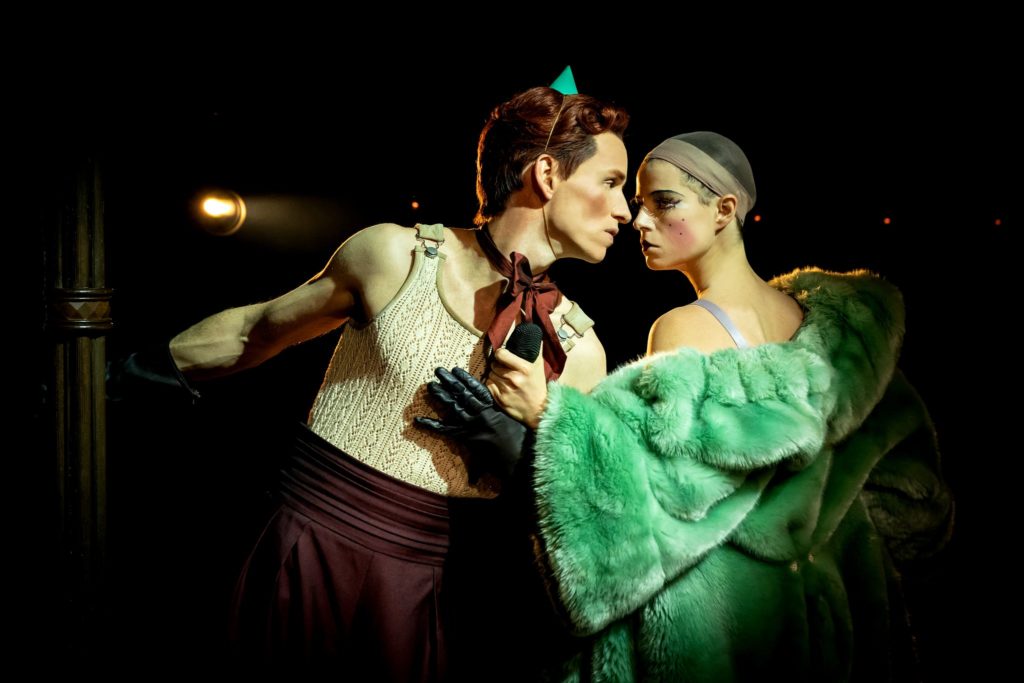
Beloved musicals, re-imagined
Then there are the musicals. Let’s start with a pair of strikingly re-imagined revivals of beloved musicals, both of which caught my imagination.
Perhaps the most hyped of these is Rebecca Frecknall’s Olivier Award-winning revival of Kander and Ebb’s Cabaret (HIGHLY RECOMMENDED) now playing at the Kit Kat Club (a.k.a. the stunningly altered Playhouse Theatre located near the Embankment). In short, it’s refreshing to encounter a production that isn’t directly influenced by Sam Mendes’s seminal revival, which was first seen at London’s Donmar Warehouse and was twice revived by Roundabout Theatre Company in New York. Ms. Frecknall’s staging is immersive and vividly reconsidered, especially with respect to its depiction of the slippery slope from complicity/ignorance to nightmarish totalitarian state. Relevant stuff, for sure. Although the performances were all impactful (particularly Amy Lennox’s angry, forceful Sally Bowls, and Vivien Parry’s unnervingly pragmatic Fraulein Schneider), it’s the production itself that really makes the strongest impression. Both intimate and spectacular, this Cabaret hurtles audiences into the charged, sensual atmosphere of the teetering last days of the Weimar Republic.
Over at the iconic London Palladium, you’ll find a brand new staging of Disney’s Beauty and the Beast (RECOMMENDED), which has settled in London for a lengthy summer run. Although the spectacle remains firmly in place, the production has been smartly reconceived and technologically updated by the stage musical’s original creative team – including director Rob Roth, director/choreographer Matt West, scenic designer Stanley A. Meyer, Tony-winning costume designer Ann Hould-Ward, and lighting designer Natasha Katz – to efficiently tour from city to city. This includes the intelligent use of video projections (the wolf chase scenes in both acts, once awkwardly staged, are now seamlessly incorporated in the narrative via video projections) and resourcefully moderate use of physical sets. Happily, the songs added to the stage adaptation like “Human Again” and “Home” are gems that belong just as much to the fabric of the musical’s storytelling as the beloved numbers from the original animated film (“Be Our Guest”, the title song, etc.). As for the cast, I was most impressed by the performances of veteran Gavin Lee as an unsurprisingly ideal Lumier, as well as the clarion-voiced Courtney Stapleton as a wonderfully natural an unaffected Belle.
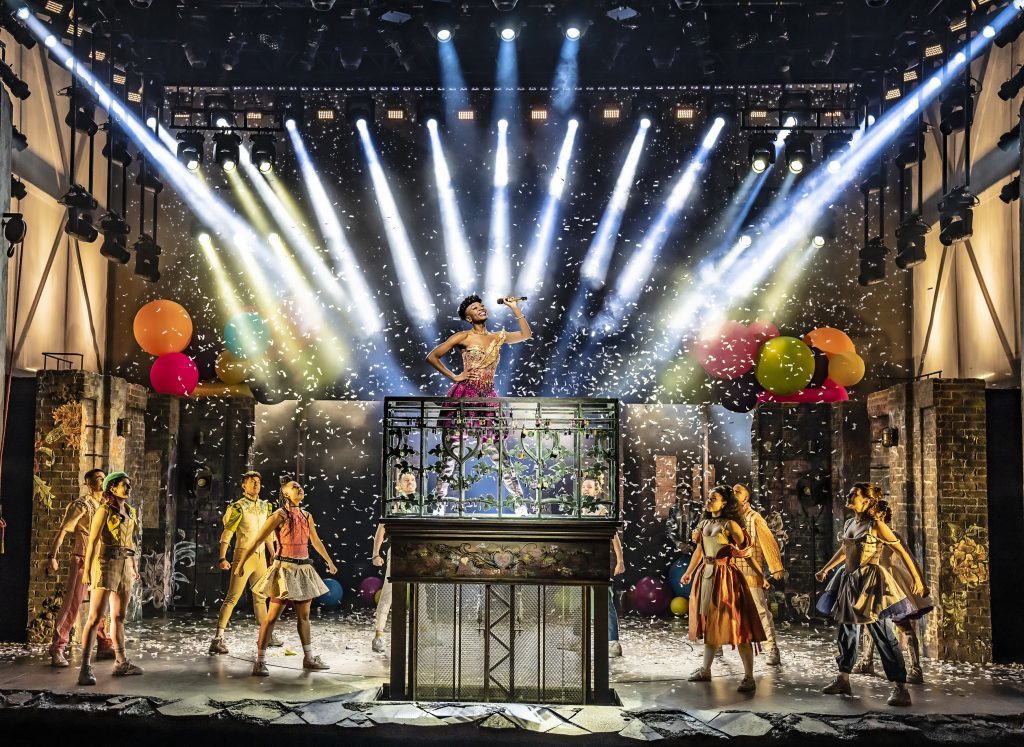
Above par jukebox musicals
To say that jukebox musicals are here to stay would be stating the obvious. As commercial and escapist ventures, they’re irresistible to many. Here are my thoughts on two of them, both of which are above par in my opinion.
I must say that I was pleasantly surprised by Get Up Stand Up! The Bob Marley Musical (RECOMMENDED) at the Lyric Theatre. If you haven’t already gathered, the musical tells the biographical story of Nigerian reggae superstar Bob Marley, from his meager childhood to his complicated adult life. Lee Hall’s book is muscular and unsentimental, qualities that one doesn’t usually associate with bio-musicals. There’s a matter-of-factness to the storytelling that thankfully avoids the triteness of most similar musicals. In the end, Get Up Stand Up! is also a jukebox musical that has something important to say, namely with respect to empowering Blackness and the realities of racism. The current production features some fantastic performances, led by a tough but understated Michael Duke as Marley (the role was originated by Arinzé Kene, who received accolades for his portrayal). As his long suffering and devoted first wife, Gabrielle Brooks is quietly gutsy. And when she opens her mouth to raise her gorgeous voice to the rafters, beauty, pain, and power simultaneously pulsate through the auditorium. The mostly Black cast ride the musical and emotional waves of the show with a generosity of spirit that’s infectious.
At the Shaftesbury Theatre, you’ll find the Broadway-bound jukebox musical & Juliet (HIGHLY RECOMMENDED) (the production will arrive on the Great White Way via Toronto, where a North American production is currently playing). In short, I haven’t had this much fun at a jukebox musical, well, since maybe the grandmother of them all, Mamma Mia! The plot is basically a sequel of sorts to Shakespeare’s Romeo and Juliet. In effect, what you get in this hit jukebox musical is a skillfully crafted love child between Shakespeare in Love and the aforementioned ABBA jukebox musical (the clever book is by David West Read). Featuring songs by pop songwriter Max Martin, you’ll inevitably find yourself bopping your head to some of the biggest hit singles from the likes of Britney Spears, NSYNC, Katy Perry, and Celine Dion. All-around, the performances were peppy and sweet. Directed with bursts of life by Luke Sheppard and featuring energizing choreography by Jennifer Weber, the whole thing comes across like a hugely entertaining, fun-filled party that you don’t want to end.
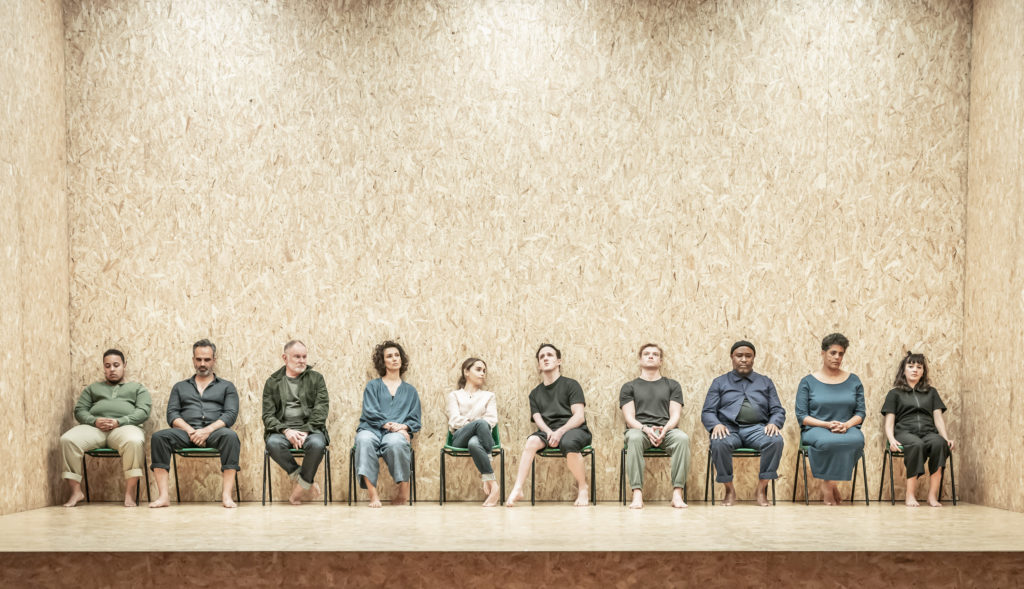
Vividly revived classics
Any theater trip to London wouldn’t be complete without taking in some of the classics. Unintentionally but fittingly, I bookended my visit with two such theater outings.
The first play I attended upon my arrival was Jamie Lloyd’s austere revival of Anton Chekhov’s oft-performed The Seagull (HIGHLY RECOMMENDED). I arrived at the Harold Pinter Theatre having been a big fan of Mr. Lloyd’s piercingly clear-eyed productions of Pinter’s Betrayal and more recently Rostand’s Cyrano de Bergerac. Similar to those productions, the auteur director’s version of The Seagull is aggressively minimalist (the set is essentially a bare plywood box and an array of green chairs) and casts a harsh light on its characters’ inner lives. Of all playwrights, Chekhov’s plays seem the ideal vehicle for this directorial approach, which may strike some as simply glorified staged readings. Don’t be fooled, however. In his Seagull, Mr. Lloyd has once again conjured a compelling theatrical tone poem, eliciting thoroughly satisfying performances from his fine cast – notably Emilia Clarke of Game of Thrones fame – whose work throb with human ache and pain. Although the experience was physically uncomfortable (the air conditioning was not working on the sweltering afternoon I attended the play), I was nonetheless drawn into the characters’ collective bruised state of mind.
The final show I attended during my London visit was the final performances of King Lear (RECOMMENDED) at Shakespeare’s Globe. Leading the way as the titular monarch was the ever-so-distinctive Kathryn Hunter. Ms. Hunter had previously performed the part – widely considered the Mount Everest of roles in the Western dramatic canon – way back in 1997 in a well-received production directed by Helena Kaut-Howson. The recently shuttered production at Shakespeare’s Globe reunited both actress and director (as well as designer Paweł Dobrzycki). The result was a decidedly traditional Lear that neither disappointed nor devastated. It was solid rendering, particularly in the hands of the actresses in the cast. Looking as frail a twig, Ms. Hunter used her singular physicality to striking use. In her interpretation, Lear was as afflicted physically as he was mentally. Refreshingly, the performance made no comment on nor called attention to any sort of gender-bending, instead focusing on simply telling the story at hand. The other standout was Michelle Terry (Shakespeare’s Globe’s artistic director), who flexed her acting muscles in impressive fashion in the roles of Cordelia and the Fool. Additionally, deliciously vicious were Ann Ogbomo as Goneril and Marianne Oldham as Regan.
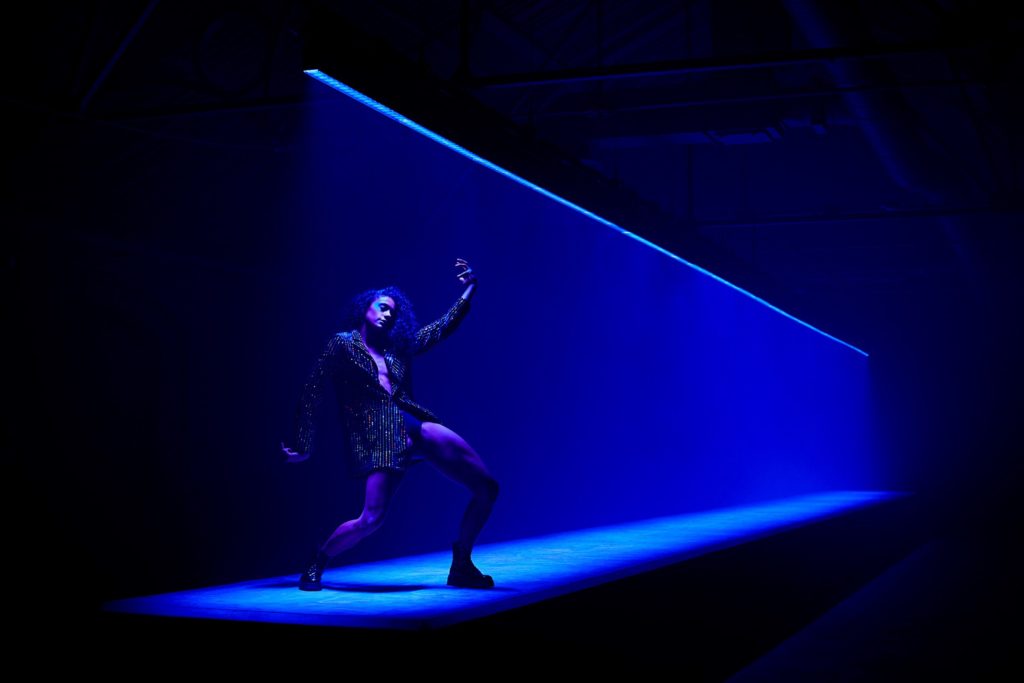
Extravagant immersive experiences
Last but not least of my adventures are a pair of singularly extravagant immersive experiences that wowed me.
First up near Queen Elizabeth Olympic Park was ABBA Voyage (HIGHLY RECOMMENDED). “Performed” in a massive, specially-build arena, the concert features projected live 3D video captures of the four members of the iconic Swedish group. The images are astonishingly life-like thanks to the impeccable CGI work of the experienced folks at Industrial Light & Magic. As a sound and light show, the experience is simply astonishing. Each of the songs (including the group’s immortal greatest hits, as well some new material from their latest album Voyage, which was released last fall) were presented with variety and ingenuity – including, curious as it may seem, two anime-inspired interludes set to ABBA tracks – resulting in an experience that dazzled my senses throughout. Most importantly, the sold out audience bought into the mirage of it all. Indeed, attending the show truly felt like attending a live pop concert. The iconic group was backed by crack 10-piece band and a bevy of game back-up singers. In summary, ABBA Voyage needs to be experienced to be believed.
One of the main reasons I trekked across the pond was to jump down the rabbit hole that is The Burnt City (HIGHLY RECOMMENDED). The immersive production – which has set up camp way out east in Woolwich – is the brainchild of Punchdrunk (perhaps the flagship and most recognizable purveyor of immersive theater), the company that brought us the long-running international sensation Sleep No More and more recently the superb The Drowned Man. The Burnt City trades in the distinctive Hitchcockian film noir of its Macbeth-inspired hit for a relatively sleeker steampunk aesthetic. True to form, this latest Punchdrunk concoction is geographically sprawling, spilling easily into three expansive buildings in its attempt to stylishly depict the events surrounding the Trojan War, both from the perspectives of the Greeks (largely inspired from Aeschylus’s The Oresteia) and the Trojans (in turn largely based on the works of Euripides, particularly Hecuba and The Trojan Women). Participants are given the opportunity, on their whim, to follow parallel events in both Greece and Troy. Directed by Felix Barrett and Maxine Doyle, the undertaking is epic even by Punchdrunk standards, employing 28 dance-trained performers that portray 54 characters. In summary, the experience was a hallucinatory fever dream chock full of phantasmagorical images. Suffice to say, The Burnt City haunts me to this day.

 Copyright © 2024
Copyright © 2024
Leave a Reply